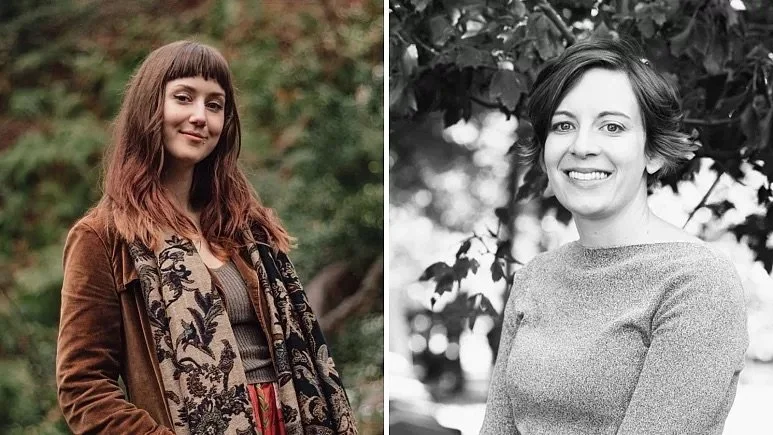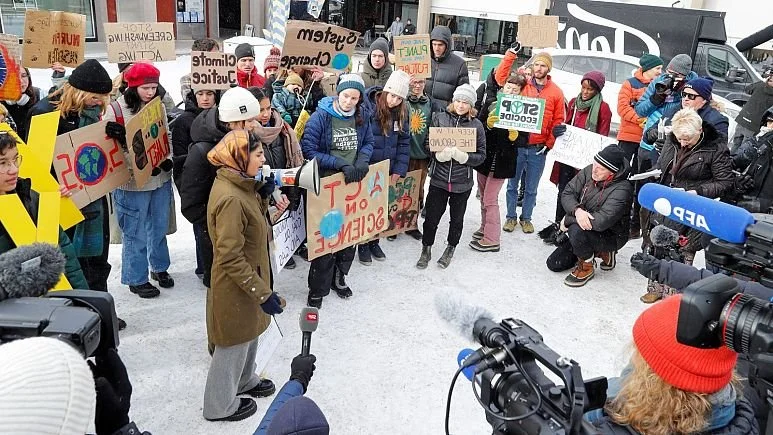
Writing portfolio
-

Meet the psychologist who matchmakes philanthropists with cash-strapped activists
Jessica Kleczka speaks to fellow climate psychologist Margaret Klein Salamon about radical climate activism and why it works.
-

‘Climate deniers are victims not villains’: A psychologist’s guide to winning them over
I encounter climate deniers all the time on social media, as some of my work is in science communication and public advocacy. In my newest article for Euronews Green, I examine the different types and causes of climate denial, and how we can tackle them.
-

Hope in Action: 10 wins against fossil fuels in 2022
2022 was the year world leaders, businesses and society woke up to the fact that there is no future in fossil fuels, and the need for a just transition towards clean energy.
-

Exposed: Equinor’s five biggest climate crimes
Equinor has only recently risen to public consciousness in the UK over its Rosebank oil field - but the Norwegian oil giant is planning a number of planet-wrecking projects around the world.
-

Anarchist communes, activism and flight-free: Inside my nine-country train adventure in Europe
Interrailing is convenient, flexible and often cheaper than flying. Here’s how I planed a nine-country trip.
-

The Rosebank oil field would be a betrayal for future generations – we cannot let it go ahead
Danielle Sams and Jessica Kleczka write about how collective action is mobilising against the Tory government’s oil and gas developments.
-

The UK government is gearing up to approve a huge climate-wrecking oil field – We must #StopRosebank
The UK could approve the biggest undeveloped oil field in the North Sea in the next few weeks. The Rosebank oil field is located off the coast of Shetland, and three times the size of the nearby Cambo oil field, which was paused after a successful campaign last year.
-

Explained: How does oil and gas licensing work?
In spite of repeated warnings from climate experts, the UK is planning a licensing round later this year, which would shoot us past the critical temperature threshold. But how does it all work, and why is campaigning important at every stage of the process?
-

The cost of living crisis is a climate justice issue - and our government is failing people and planet alike
The cost-of-living and climate crises are intimately linked. The profiteering of energy firms is largely behind the massive increase in energy and fuel costs, yet the UK remains the most profitable country for oil and gas companies. Our reliance on these dirty fuels is driving up bills domestically, and accelerating climate impacts worldwide
-

Why is the UK putting the Cambo oilfield back ‘on life support’?
There is no denying that the controversial Cambo oil field was halted through people power. With a lifetime emissions equivalent of eighteen coal-fired power plants, it had been a stain on the Government’s track record as a self-proclaimed climate leader since the day of its conception. Jessica Kleczka, Researcher and Writer at Uplift, explains why we must pull the plug on new oil and gas.
-

“Not here, not anywhere”: Five campaigns to follow this World Africa Day
Despite having contributed the least to the climate crisis, Africa is the continent most vulnerable to climate breakdown. This World Africa Day, we are amplifying five powerful campaigns across the African continent that are resisting extractivist industries and fighting for the rights of local and Indigenous communities.
-

Why isn’t the government using new powers to end the scourge of throwaway culture?
Earlier this month marked the six month anniversary of the Environment Act coming into force. It was a groundbreaking piece of legislation, not least in its new powers to tackle single use materials, beyond plastic. But, half a year on, the clock is still ticking, awaiting government action to accelerate the shift away from throwaway culture.
-

“Colonialism hasn’t stopped, it just changed shape”: The toxic truth about natural gas
In the race to phase out coal and oil, gas has been branded as a greener and cleaner midterm solution as we shift towards renewable energy systems. In my interview with Ya’ara Peretz from Gastivists, she shares why clean gas is a dirty lie, and how fossil gas fuels destruction and geopolitical conflict.
-

Beyond eco-anxiety: How climate change affects your mental health
The climate crisis is arguably the greatest threat to life on our planet. It is a threat that we have met with astonishingly inadequate action. Climate change is a perfect storm – because it is often invisible and seen as a future problem, our psychological reaction often doesn’t match the urgency of the crisis.
-

“By failing to end fossil fuels, world leaders are feeding new Putins”
In conversation with climate activists from Ukraine and Russia about the links between the war and the world's dependence on fossil fuels.
-

“Every oil and gas field we stop saves lives”: How the climate crisis affects public health in the UK
Climate change is the biggest threat to public health in the UK and globally, with its impacts now undeniably felt across the world. I interviewed Abi Deivanayagam from Race & Health on how fossil fuels increase risk of disease, and why marginalised groups are disproportionately affected.
-

#StopEACOP: Uganda and Tanzania in the battle against oil giants
The East African Crude Oil Pipeline (EACOP) in Uganda and Tanzania is a major environmental threat to some of the most delicate ecosystems in the world. I interviewed Omar Elmawi from the StopEACOP campaign to find out how the huge new pipeline is set to perpetuate neocolonialism in East Africa…
-

This International Women’s Day, we must recognise that climate change is not gender neutral
In the struggle for climate justice, we must aim to dismantle the dysfunctional societal systems which created climate change in the first place - and the oppression of women is one of the pillars carrying those systems which endanger our hope for a liveable future. For this International Women’s Day, we asked a group of female climate leaders for their message to the world.
-

The newest IPCC report underlines the urgent need to end oil and gas production now
Monday saw the release of the much-awaited new IPCC report, with a focus on climate change impacts, adaptation and vulnerability. Widely termed the “bleakest IPCC ever”, it paints an urgent picture of extreme weather events, mass displacement, and a closing window of opportunity to take rapid action. But while it may send some down the path of despair, we still have time to act for a better future.
-

We already have the solutions to the energy crisis - what’s missing is political will
With gas prices spiralling out of control and millions experiencing fuel poverty, it is becoming increasingly clear that the UK must end its reliance on fossil fuels. The solutions are right in front of our eyes - but government action is lagging behind.
-

We are losing our right to protest – here’s how you can take action
Last year, a collective outcry amongst environmentalists and human rights advocates echoed across the country when the UK government published its proposed Police, Crime, Sentencing and Courts bill, which gives police extraordinary powers to crack down on the freedom to protest. The bill will be debated in the House of Lords next week.
-

Five climate wins in 2021 that give hope for the year ahead
2021 was a key year in the fight against climate change. While environmental policy is yet to be aligned with rapid decarbonisation and a just transition, it is worth recognising these five big events which pave the way for more ambitious climate action in the year ahead.
-

The Cambo oil field has been paused, now we must prioritise a just transition to end fossil fuels once and for all
The oil giant Shell has withdrawn from the Cambo oil field. What does this news mean for the main stakeholder Siccar Point Energy and the dozens of other projects in the pipeline?
-

How to look after your mental health as an activist
From the climate crisis, to the pandemic and criminalisation of protest – 2021 has been a difficult year. The winter months are a good time to reflect on how activism affects our mental health, and what practices we should engage in to make our journey as campaigners more sustainable.
-

The Beyond Oil and Gas Alliance marks a big step towards the end of fossil fuels - but it must aim to increase governments’ ambition
On November 11, the Beyond Oil and Gas Alliance was officially launched at COP26 in Glasgow. But does it have the potential to accelerate a global phase-out of oil and gas?
-

Fossil fuel giants on trial as oil rigs transformed into affordable housing
#OneDayIn2050 is a collaborative project featuring 365 fictional news from 2050, one for each day. 365 voices from the future to teach us about climate change. A 365º unique vision on the future of our planet.
-

See you in court: Five cases around the world showcasing that climate litigation works
With the Paid to Pollute case going to the High Court in London next week, it is worth reflecting back on five cases which have successfully fought for more ambitious climate action, in the hope that they will inspire many activists to hold governments and corporations accountable going forward
-

Legal cases are putting the government and companies on the spot to prove their green credentials
The Oil and Gas Authority, a government body appointed to ensure “maximum economic benefit from oil and gas reserves”, will be at the Royal Courts of Justice on 8 December over public payments to the fossil fuel industry. Learn more about the “Paid to Pollute” case and why the government is paying public money to the fossil fuel industry…
-

#StopEACOP: The 900-mile pipeline in East Africa that will devastate communities and ecosystems
The East African Crude Oil Pipeline is set to be the longest heated oil pipeline in the world. It will displace thousands of families, devastate ecosystems and endangered species, and speed up climate change. Learn more about this destructive project and how you can help.
-

After COP26: Moving away from the binary of success and failure
Since the Glasgow Climate Pact was signed, media portrayals of COP26 have been polarised between framings of success and failure. But in order to sustain and increase political pressure, we must move away from binary thinking and bring more nuance into our communication.
-

Reality Check: Is the UK’s Climate Policy on Track with its Climate Goals?
The UK is hosting the current historic COP26 conference. But what is the UK Government’s own track record on climate, and does it hold up to scrutiny?
-

COP26 debate in Parliament: The Good, the Bad, and the Ugly
Last week, MPs debated "COP26 and limiting temperatures to 1.5 degrees" in the House of Commons. I analysed the key arguments and what they mean for climate action.
-
Wokewashing - the fossil fuel industry’s new favourite tool
The fossil fuel industry has given up on climate denial. Instead, its newest delay tactic is to jump on the social justice bandwagon. I analysed how big oil exploits BLM and feminism to increase profit and stall ambitious climate policy.
-

#StopLine3 - Water protectors fight to protect Indigenous lands and livelihoods
After 6 years of legal battle, oil started flowing from the Line 3 pipeline this month. Water Protectors continue to take legal action in the courts and organise protests across the country.
-

Climate groups urge UN to postpone COP26
1,500 climate groups from 130 countries call for COP26 to be postponed over vaccine inequality and rising cost of travel and accommodation.
-

Visions of Alternative Futures: Brithdir Mawr, Wales
Brithdir Mawr is a low-impact eco-community near the picturesque coast of Pembrokeshire in South Wales. The community uses renewable energy, grows its own food through most of the year and lives in harmony with nature according to permaculture principles.
-

Stories from the Frontline: The Maasai Eviction in Tanzania
The Maasai, one of East Africa’s long-standing Indigenous People, are facing eviction to make more space for Ecotourism and trophy hunting.
-

Stories from the Frontline: “The Fight for Life” – The Indigenous Resistance in Brazil
Brazilian president Jair Bolsonaro and agri-business lobbies are trying to strip away constitutional land rights of Indigenous communities so lands can be exploited for profit.
-

Visions of Alternative Futures: Findhorn Ecovillage, Scotland
Findhorn is a spiritual community and eco-village which has inspired thousands of people since its beginnings almost sixty years ago. Rooted in an intimate connection with nature, it is a global centre of sustainability education which demonstrates how we can live in harmony with the land.
-

Stop Cambo: The fight against a new oil field in the UK
Oil giant Shell and Siccar Point Energy are seeking permission from the UK Government to develop a large new oil field in the Cambo Field, West of Shetland. Thousands of activists across the country and internationally have been mobilising in protest.
-

Visions of Alternative Futures: Braziers Park, Oxfordshire
Braziers Park is a unique intentional community taking a progressive approach to education through creation. At 70 years, it is the oldest surviving secular community in the UK.
-

All eyes on G7: Why world leaders will be met with resistance in Cornwall this month
Thousands of activists from over 30 environmental groups are expected to disrupt the G7 summit in Cornwall by blocking main roads into the county, obstructing convoys carrying world leaders, and targeting a cruise ship filled with police officers.
-

Why ‘Kill the Bill’ is a Feminist Issue
In recent weeks, people across the UK have been taking to the streets to fight against the Police, Crime, Sentencing and Courts bill. How does the police crackdown bill affect women and why is it important to take action now?
-

In Conversation: The Roots of Climate Change Denial
Climate change denial is still high despite an established scientific consensus. What are the underlying psychological reasons for climate denial and what can we do to tackle it? Two young environmentalists share their experiences.
-

Climate Census UK: How you can take climate action from home
The Covid-19 pandemic has limited our ability to protest for climate action – Climate Census is an exciting new opportunity to make your voice heard in the upcoming UK census. Read more about the census and upcoming mass digital action here.
-

Are our cultural identities in the way of climate action?
Five years after the Paris agreement, many of us still avoid taking climate change seriously. What role do cultural identity and psychology play in climate denial and how can we inspire the changes we need to see?
-

Talking Mental Health with Karolina from London Wildlife Trust
Spending time outdoors has been scientifically proven to benefit our wellbeing. I had the pleasure of speaking to Karolina from London Wildlife Trust about the importance of socialising in outdoor settings and the effects of this on mental health.
-

How to cope with Ecological Grief
Wildfires, a melting arctic, rising sea levels – many will recognise the deep unease these headlines create within ourselves. While concern about the future is a normal response, many experience profound feelings of depression and grief relating to the environment.
-

An Introduction to Intersectional Ecopsychology
In recent decades, rates of depression have exponentially risen to become the second leading cause of disability worldwide, closely followed by anxiety. At the same time, we are faced with the pressing issues of social inequality, environmental destruction and climate change.


